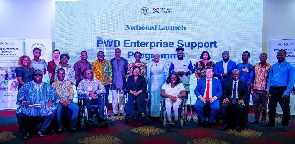 Businesses owned by persons with disabilities have yielded positive growth
Businesses owned by persons with disabilities have yielded positive growth
The Ghana Enterprises Agency (GEA) has launched a specialised support programme for persons with disability (PWD) under its micro-, small-, medium enterprise (MSME) support activities.
Dubbed the PWD Enterprise Support Programme, the intervention demonstrates government’s commitment to improving businesses owned by persons with disabilities (PWDs).
The programme is part of a series of government interventions targeting different categories of local businesses and is funded by the World Bank under the Ghana Economic Transformation Project (GETP). It allows for financial resources and expertise to be directed toward supporting PWD-owned businesses.
She added that the programme represents a significant step toward inclusivity and empowerment for PWDs in the business sector, through the provision of tailored support that aims to create a more enabling environment for PWD-owned businesses and contribute to their economic and social development.
“The growth of businesses owned by persons with disabilities in Ghana is a positive development that will help promote a more inclusive and diverse society. By supporting and empowering these entrepreneurs, we can build a more equitable and prosperous future for all,” she said.
The GEA is currently implementing a flagship of the GETP called the SME High Growth Programme, and according to Mrs. Yankey-Ayeh, it was observed that PWD enterprises are woefully underrepresented. For instance, of the over 2,600 applications received within four weeks of the call for applications, only 33 were from PWD enterprises.
“It is in this regard that the government through the Ghana Economic Transformation Project is providing funding and technical assistance to such businesses across the country,” she said.
Deputy Minister of Trade and Industry, Dr. Stephen Amoah, lauded the World Bank for funding the programme – saying it will facilitate transitioning the targetted MSMEs into their next stage of growth, thereby improving the quality of life for PWDs while increasing their contribution toward the social economy of Ghana.
“This intervention demonstrates the government’s commitment to enhance and create inclusive economic growth across the country,” he stated.
About 8 percent of Ghana’s population above 5 years have varying degrees of disabilities, with the incidence of disability higher among females (8.8 percent) than males (6.7 percent); and with up to 59 percent of PWDs living in the rural areas as against 41 percent in the urban centres, according to the 2021 Population and Housing Census Report.
Though PWDs represent a significant percentage of the population, they are confronted with many challenges including lack of employment opportunities. Those with employable skills or businesses generally must compete with non-PWDs, and usually from a disadvantaged position.
“It is, therefore, crucial that we challenge the negative stereotypes and attitudes which often surround disability,” said the Minister for Gender, Children and Social Protection, Lariba Zuweira Abudu.
“By embracing diversity and promoting inclusion, we can create a society that values and celebrates the contributions of all its members. Let us commit ourselves to building a more inclusive and equitable society for persons with disabilities in Ghana,” she stated.
The World Bank Country Director, Pierre Frank Laporte, added that the global development and poverty reduction agenda can only be met when the full potential of everyone is explored, including persons with disability.
“These are persons whose voices and potentials are often ignored even though they have abilities. They face exclusion, stigma and discrimination in accessing employment, education, health care and general development gains,” he stated.